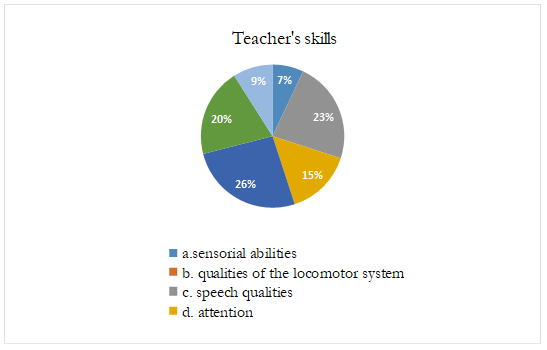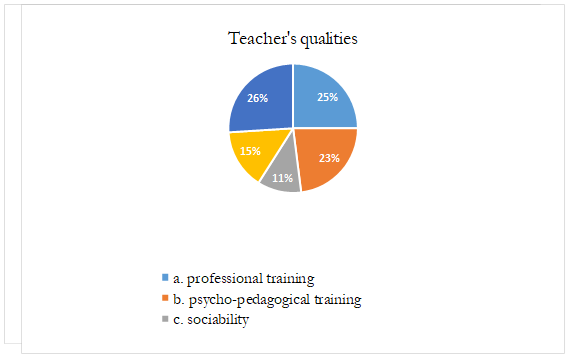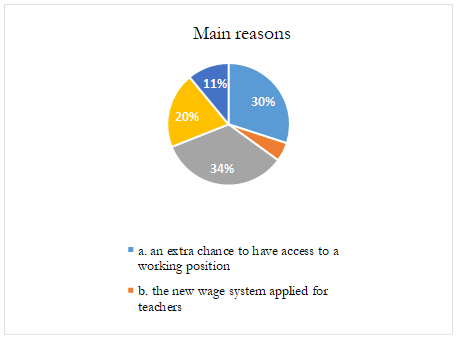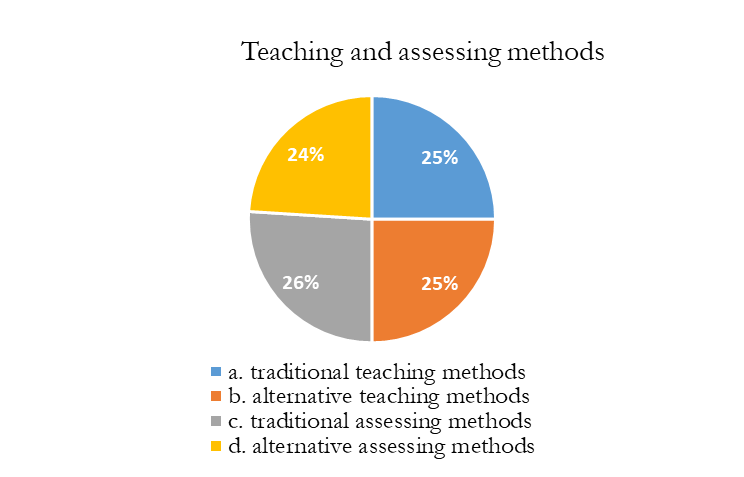Abstract
Our study begins by presenting some formal characteristics of our contemporary society such as: globalization and digitization, which mark the dynamics of professions, in the sense that some of them are practiced more rarely or even disappear, while other new professions appear. The teaching position seems to be advantaged by these changes, thus having great improvement perspectives. In the second part of this paper, we present some theoretical aspects regarding the status of the teaching staff. Including some objections raised by several social sciences specialists. Having the theoretical support outlined above we intend to assess the current initial psycho-pedagogical training in order to improve it. In the study, several significant methodological aspects are established and used in forming 7 hypotheses and 13 questionnaire items. The theoretical results are presented in four charts properly analyzed. Certain data has been analyzed statistically by using the rank correlation indicator. Most of the hypotheses have been confirmed, some useful information being derived from this research, that will be useful for the improvement of the curriculum of the teacher training Department. The main conclusions of the study are on one hand, the possibility and necessity to organize and perform actual research about the way the training activities of the future teachers unfold and, on the other hand, the necessity to ensure the constant increase of the teaching staff profession and status.
Keywords: The teaching professionteachers’ statusthe initial training of the future teaching staffthe improvement of the Teacher Training Department activitystudents’ representations
Introduction
The contemporary society is characterized by radical changes in all fields of activity and on all continents. The characterization made by Hargreaves catches our attention and states, “the current society lies within a transition from modernity to post modernity” ( as cited in Păun, 2017, p. 115). The avalanche of transformations in the field of economy, such as mechanization and digitization implies important changes regarding professions. Some branches of the economy that have encountered favourable development in the previous decades seem to be now blocked by restrictions such as the raw material crisis or de danger of pollution. The issues faced by economic development, some of them being insurmountable, favour the modernization and bringing to the forefront of certain secondary sectors such as health and education which cannot be hindered by the lack of resources or pollution.
It is known that at the beginning of the last century intense debate took place over the educational crisis. In the seventies, Ivan Illich predicted the extinction of school, its role being taken by the development of libraries. Recently, Noegalin and his Canadian school stated that mass- media would take the place of school. These predictions however were not confirmed. Despite the difficulties and some short periods of recess, school has managed to face successfully the new challenges engaging even more in the thorough maturing processes such as globalization and Europeanisation. Bearing in mind the socio-economic and political processes depicted above, we can state that the school and mainly university systems undergo some changes in terms of quantity and quality, changes they have never met before. Considering that, “school must adapt itself to social changes and needs and must reduce the stagnation and conservatism indicators as much as possible” Păun ( 2017) claims, at the same time that school “must influence and determine changes within the society and have an active role in this regard” (p. 119).
The socio-economic and socio-cultural transformations have important effects on professions. We refer not only to the classical process of new jobs and professions emerging especially in the IT area but also to the reduced practice or even disappearance of some classical professions. Thus, nowadays a human resources management is being outlined and its aim is to organize and complete an efficient profession management. Approaching the issue of career management, Pânișoară and Pânișoară ( 2016) highlight the role of career management in the model of competences and career theory. Referring to the last theory, Pânișoară and Pânișoară ( 2016) notice, “at the same time with shaping an identity in terms of jobs and professions, we register the emergence of a distinct pattern of means, values and needs from the career point of view” (p. 266).
Assessing the ongoing socio-economic and cultural processes, Cucoș ( 2014) considers that the educational system represents a goal and not an endless endeavour, “any educational system can be analysed according to various axes: past – present- future, local –central – international- diagnosis (it was what it was) – acknowledgement (of what it is) – projection ( of what could be). The educational reform has been discussed for years, the paradigm of educational policy is being changed, it is being built, dismantled, and experimented upon and educational projects undergo the probation of intention” ( Cucoș, 2014, p. 23).
The initial training of the teaching staff in Romania is performed by means of the Teacher Training Department. In other words, simultaneous with their specialization training students can train as future teachers. This simultaneous training facilitates the association of specialization knowledge with psycho-pedagogical knowledge, thus assuming that a proper structure of the future teacher is being created. The teaching plan of the Teacher Training Department is organized on two levels: the first level corresponds to the degree cycle of three years and the second level is represented by the master degree, which is two years.
Problem Statement
In the context of such a changing society characterized by permanent reorganization, together with the reality of the expansion of the educational system, as well as the assertion of the university as a genuine pole of culture and science, the unity of the thorough analysis, scientifically underlain of the teaching staff profession is being more and more outlined. Analysing “European dimensions and values in the management of training the teaching staff” more than a decade ago, we defined the teacher as being the manager of the educational activities who shall administer the whole school activity. We pointed out that the transformations in the educational system, “the rising of the complexity degree of the educational activities and of the teaching staff profession implies the necessity of multiple training forms (of the teaching staff), in order to be able to meet the actual requirements which sometimes are extremely divers” ( Orțan, 2006, p. 17).
The importance of the didactic profession explains the concerns to ensure a proper training of the teachers. The issue of the teaching staff status appeared as a distinct topic in the case of permanent teacher certification and the second didactic degree. Păun, Iucu, and Șerbănescu ( 2008) have carefully analysed the status, the role and the competences of the teachers to establish some standards and shape the personality of the teachers. The insufficiently grounded theories regarding the teaching activity are being questioned. According to these theories “the teaching activity, despite the maturity it has reached cannot be considered a profession, but rather a semi- profession” ( Păun et al., 2008, p. 427). The Bucharest pedagogues underlines the necessity of research development regarding the teaching staff profession characteristics.
Research Questions
The immediate connection between the author and the subjects of the research helped obtaining direct information regarding the preferences and attitudes of the students, the kind of observation and the type of interview, as well as the context which determined the expression of certain opinions, which allowed the author to understand the picture and the concept of the performance of the whole process of initial training of the future teachers. The research is based on several key research questions: What are the characteristics of an ideal teacher? What are the most important skills, qualities of a teacher? What are the most popular teaching and assessment methods and pedagogical subjects?
Based on the landmarks initially expressed we have established several hypotheses:
The characteristics of an ideal teacher are quite the same, regardless of the country and the educational establishment
The most important skills of a teacher are the ability to express themselves easily (qualities of language) and their psycho-emotional potential (emotional abilities)
The most appreciated qualities for a teacher are sociability and psycho-pedagogical training
The main reason for choosing this career is the desire to work with children
The most popular teaching and assessing methods are the new, alternative ones.
The students from the Teacher Training Department prefer pedagogical practice and writing papers.
Among the subject matters offered by the Teacher training Department the students prefer the one called “The Fundaments of Pedagogy. The Theory and methodology of Training and Evaluation”.
Purpose of the Study
The main purpose of our research is to assess and optimize the training programme of the future teachers by depicting their attitudes, opinions and preferences in terms of the evolution of the teaching process. Our research has an applied characteristic, the author organizing courses on training students and supporting the management activity of the Oradea Teacher Training Department. By means of collecting, analysing and interpreting the students’ answers to a questionnaire, we intended to describe the actual process of the evolution of the school activity, thus having the possibility to identify the students’ reactions to various teaching methods and techniques.
Research Methods
Our research, based on the pedagogical survey method, could facilitate the optimization of the complex teacher training activity and the improvement of the teaching techniques and assimilation procedures. During the first stage, we have identified some marks according to which we can orientate ourselves in our activity meant to diagnose and investigate the students’ reactions to the projects suggested by the teachers. These landmarks, based on which we formulated items and hypotheses, are the following: the characteristics of the ideal teacher, the abilities of the teaching staff, the reasons why the students have chosen the course offered by the Teacher Training Department, their favourite teaching and assessing methods in relation to the subject matter they choose, certain directions and patterns students apply when dealing with bibliography etc.
While approaching the topic of “professional competence of educators”, Istrate ( 2001) talked about a pattern of features characterizing the ideal teacher as resulting from “a survey applied at the end of the year 1989 among the students from the Montreal and Moncton universities from Canada” (p. 79). We chose to keep the same fifteen characteristics suggested by the Canadian universities to compare our students’ answers to those presented by Istrate ( 2001). Similarly, we have used the suggestions made by Istrate ( 2001) and Mitrofan ( 1988), while establishing the psychological skills of the teaching profession (psychodrama). Alongside the two fundamental questions, asked according to the landmarks established previously, we have introduced preferential items regarding the subjects in the curriculum and the teaching and assessing methods. We have also added a question with a socio-metric characteristic, asking students to name the titles and the authors of the last three textbooks or books of pedagogy they studied. The main method used was that of applying a thirteen question survey, the first seven questions being formulated with the help of the landmarks mentioned above and we also added factual questions regarding sex, faculty, specialization, the year of study, the year they have passed their baccalaureate exam, the mark they got in this exam. In the construction of the research instruments, we integrated suggestions and recommendations from several other studies in the field of curriculum preferences patterns ( Strunga, Bunaiasu, & Stefan, 2013; Strunga & Bunaiasu, 2013), educational staff professional identity ( Iucu & Strunga, 2014; Strunga, 2015b).
The first stage of the research took place in January 2019, 61 students filled in the questionnaires and the results are presented below. Our intention is to create a connection, in the sense that the same questionnaire will be applied at the end of the university year to more students, approximately 140 students. The research can be performed in the following years as well but maintain the number of students to 200. Almost all students answered to the closed questions. The answers given to the open questions were incomplete; if in the case of the first question we got no answers; to the preferential questions, 7 and 7 a, we got enough answers in order to be able to test the established hypotheses.
Findings
The first hypothesis was confirmed in the sense that both Montreal students and those from Oradea University have identified the main features of the teachers. The research data gave us the chance to support this hypothesis according to the statistics. Thus, we put next to the classification offered by the Montreal researchers our own classification by evaluating the status differences and the status correlation coefficient, which turned out to have an increased value, 0.81. The second hypothesis was tested by means of the third question: “What teacher skills are the most important?” and it was also confirmed, that is, most students answered that among the essential skills of a teacher the most important is the ability to express themselves. (49 students, 23%) On the other hand, a more frequently mentioned teacher ability was the one regarding the intellectual skills of the teacher (55 students, 26%) (See figure

The third hypothesis was tested through question 4: “Which are the most appreciated qualities of a teacher?” It was not confirmed (See figure

Sociability is indicated only by 20 students, that is 11%, the psycho-pedagogical training by 23%, 41 students, most choices refer to professional training- 45 students, 25% and character, correctness, 46 students, 26%. Hypothesis number 4 was completely confirmed (See figure

The main reason why students registered for the Teacher Training Department, that is, they chose the initial training as future teachers. The reason- the desire to work with children was mentioned by 34% of the subjects asked (28), this motivation being stronger than the perspective of having a job indicated by only 24 students (30%). Fewer answers were given for the motivation of teachers because of their wages. Although their wage levels have increased, they are regarded as being low if compared to other professions.
The fifth hypothesis was totally invalidated by the data of our research (See figure

Thus, the traditional teaching and evaluation methods are more appreciated by the students than the new, alternative ones. The traditional methods were chosen by 40-41 students and only 39 and 37 students preferred the alternative methods. Hypotheses 6 and 7 have also been confirmed. It has been proved that pedagogical practice and the main subject matters from the Teacher Training Department curriculum generally correspond to the students’ interests and preferences.
Conclusion
Our research method proved not only the possibility of operationalizing and quantifying the didactic activities of the Teacher Training Department, but also the usefulness of such an endeavour, in the sense that the information we got by means of this research formed the base for the methodical discussions regarding the improvement of methodical activities. Moreover, the information derived from our research offered clues regarding the thematic preferences of the students in terms of several courses and chapters of the courses.
Our research has pointed out an increasing tendency of the teaching career prestige, this being owed not only to an objective motivation (greater chances to find a job) but also to a psychosocial motivation sui generis to the wish to relate to children.
References
- Cucoș, C. (2014). Pedagogy. Iași: Polirom Publishing House.
- Istrate, E. (2001). Educators’ professional Competence. In I. Jinga & E. Istrate (Eds.), Book of Pedagogy. Cluj-Napoca: Europontic Publishing House.
- Iucu, R., & Strunga, A. C. (2014). European Mental Images and Professional Identity in the Initial Primary Teacher Education. Revista De Cercetare Si Interventie Sociala, 46, 190-202.
- Orțan, F. (2006). European Dimensions and Values in the Management of Teaching Staff Training. Oradea: Oradea University Publishing House
- Păun, E. (2017). Pedagogy. Challenges and Dilemmas Regarding School and teaching. Iași: Polirom Publishing House.
- Păun, E., Iucu, R. B., & Șerbănescu, L. (2008). The Professional Status of The Teaching Staff: status, role, competences, standards, personality, constant training, assessment, self-assessment. In D. Potolea, I. Neacșu, R. B. Iuc & I. O. Pânișoară (Eds.), Psychopedagogical Training. Textbook for the permanent teacher certification and the second didactic degree exams. Iași: Polirom Publishing House.
- Pânișoară, G., & Pânișoară, I. O. (2016). Human Resources Management. Iași: Polirom Publishing House.
- Mitrofan, N. (1988). Pedagogical Skill. Bucharest: Didactic and Pedagogical Publishing House
- Strunga, A., Bunaiasu, C., & Stefan, M. (2013). Curriculum Preferences Patterns of Education Sciences Students from the University of Craiova. Psiworld 2012, 78, 140-144.
- Strunga, A. C., & Bunaiasu, C. M. (2013). The investigation of the curricular preferences of students from primary and preschool pedagogy specialization. Premises for a model of action and socio - pedagogical intervention. Revista De Cercetare Si Interventie Sociala, 40, 61-77.
- Strunga, A. (2015b). Using virtual learning communities in shaping the professional identity of primary and preschool pedagogy specialization students: a knowledge management approach. 6th International Conference Edu World 2014: Education Facing Contemporary World Issues, 180, 460-467.
Copyright information

This work is licensed under a Creative Commons Attribution-NonCommercial-NoDerivatives 4.0 International License.
About this article
Publication Date
17 June 2020
Article Doi
eBook ISBN
978-1-80296-084-6
Publisher
European Publisher
Volume
85
Print ISBN (optional)
-
Edition Number
1st Edition
Pages
1-814
Subjects
Teacher, teacher training, teaching skills, teaching techniques, special education, children with special needs
Cite this article as:
Orțan, F. (2020). Students’ Representations And Perceptions Regarding The Teaching Staff Status. In V. Chis (Ed.), Education, Reflection, Development – ERD 2019, vol 85. European Proceedings of Social and Behavioural Sciences (pp. 294-301). European Publisher. https://doi.org/10.15405/epsbs.2020.06.29
